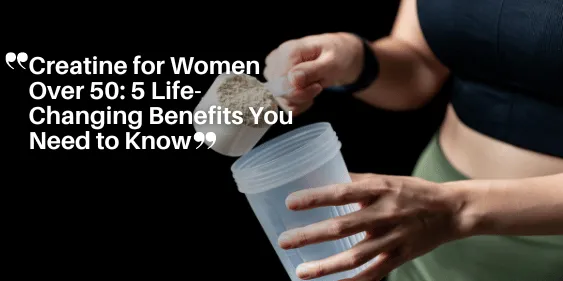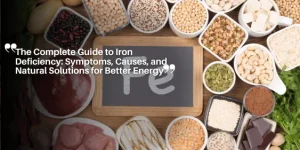Creatine for Women Over 50: 5 Life-Changing Benefits You Need to Know

What is Creatine?
Creatine is a naturally occurring compound found predominantly in muscle cells.
It serves a crucial role in energy production, especially for short bursts of intense activity like weightlifting and sprinting.
Your body synthesizes creatine from amino acids, and it’s stored in your muscles as phosphocreatine.
When you engage in high-intensity activities, phosphocreatine aids in the rapid production of adenosine triphosphate (ATP), which acts as an energy currency for your cells.
Natural Decline in Creatine Production with Age
As we grow older, our bodies undergo numerous changes, including a natural decline in creatine production.
This decline is more pronounced in women, who typically have lower creatine stores compared to men to begin with.
The production and storage of creatine in the body also diminish with age, which affects muscle function and energy levels.
For women over 50, this decline can be a significant factor contributing to muscle loss, reduced strength, and lower energy levels.
Why Women Over 50 May Benefit from Creatine Supplementation
Given the natural decline in creatine production with age, there are compelling reasons for women over 50 to consider creatine supplementation. Here are some benefits:
- Preserving Muscle Mass: Creatine supplementation helps to maintain muscle function and counteracts age-related muscle loss. By providing your muscles with an adequate supply of creatine, you can prevent the deterioration of muscle tissues, which is crucial for staying active and mobile.
- Enhancing Strength Gains: When combined with strength training, creatine can enhance strength gains and support the development of lean muscle mass. This combination not only helps in building muscle but also improves overall strength and physical performance.
- Boosting Energy Levels: Creatine plays a pivotal role in ATP production, thereby enhancing your energy levels. This can be especially beneficial during exercise sessions or daily physical activities, ensuring that you remain active and energetic.
- Supporting Cognitive Function: While most creatine is stored in muscles, a small amount is also found in the brain. It contributes to cellular energy production and cognitive function, which might help women experiencing cognitive changes associated with menopausal transitions.
- Improving Quality of Life: By preserving muscle mass, boosting energy levels, and supporting cognitive function, creatine supplementation can contribute to the overall quality of life. Women over 50 can thus enjoy a more active, vibrant, and empowered lifestyle.
Understanding these benefits can help women over 50 make informed decisions about incorporating creatine into their wellness routines, paving the way for a stronger, healthier, and more vibrant life.
Combating Age-Related Muscle Loss and Strength Decline
How Creatine Helps Preserve Muscle Mass
As women age, especially after 50, muscle mass naturally declines. This process, known as sarcopenia, can significantly impact strength, balance, and metabolic rates.
Creatine supplementation plays a critical role in combating sarcopenia by helping to preserve muscle mass.
By supplying your muscles with the energy they need, creatine aids in maintaining muscle function and can slow down muscle degeneration.
Enhancing Strength Gains When Combined with Strength Training
Strength training is highly beneficial for women over 50. When combined with creatine supplementation, the benefits are amplified.
Creatine provides readily available energy for your muscles during high-intensity activities, enabling you to push harder and garner greater strength gains.
Research shows that creatine supplementation can significantly enhance strength and lean muscle development, even in older adults and postmenopausal women.
Countering Sarcopenia and Its Effects on Metabolism
Sarcopenia doesn’t just affect muscle mass; it also impacts metabolism.
Muscle tissue burns more calories at rest than fat tissue does.
By preserving and even increasing lean muscle mass through creatine supplementation, you can positively impact your metabolism.
This translates to a more efficient calorie burn, which can aid in weight management and body toning.
By maintaining muscle mass and improving strength, creatine supplementation serves as a powerful ally in the fight against age-related decline.
As you continue learning about creatine’s benefits for different aspects of health and wellness, you’ll discover its potential to support a vibrant, active lifestyle.
Boosting Metabolism and Improving Body Composition
Creatine’s Role in Increasing Lean Muscle Mass
As women age, lean muscle mass tends to decline, often leading to a slower metabolism and decreased energy levels.
This is where creatine can be a game-changer.
Creatine is stored in muscle tissue and provides a quick source of energy for high-intensity activities.
By supplementing creatine, women over 50 can enhance their ability to build and maintain muscle mass.
This increase in lean muscle mass does more than just make you stronger; it has a ripple effect that benefits your entire body composition.
How Increased Muscle Mass Affects Metabolism
When you have more muscle mass, you burn more calories even at rest. This is because muscle tissue is more metabolically active than fat tissue.
As you build muscle, whether through creatine supplementation or strength training, your resting metabolic rate increases.
This means you can maintain or even lose weight more easily as your body becomes more efficient at burning calories.
In essence, more muscle equals a higher metabolism, making it easier to manage your weight.
Potential Benefits for Weight Management and Body Toning
A faster metabolism isn’t the only benefit of increased muscle mass. As muscle replaces fat, you’ll likely notice improvements in your body composition and overall tone. This can lead to:
- Easier weight management, as your body becomes more adept at burning calories.
- Enhanced body tone, giving you a more defined and sculpted appearance.
- Increased energy levels, making daily activities easier and more enjoyable.
These benefits collectively contribute to a more active lifestyle, fostering both physical and mental well-being. In addition, the enhanced muscle strength can improve balance and coordination, further contributing to a healthier life.
As we continue to explore the benefits of creatine for women over 50, the next area to consider is how it can enhance cognitive function and support overall brain health.
Enhancing Cognitive Function and Memory
Creatine’s Presence in the Brain and Its Importance
While creatine is more famous for its role in muscle energy production, it also plays a significant part in brain function.
A small portion of our body’s creatine is found in the brain, where it helps generate ATP, the primary energy source for cellular processes.
This readily available energy is crucial for maintaining optimal cognitive function, especially as we age.
Potential Cognitive Benefits for Women Experiencing Menopausal Changes
Navigating the cognitive challenges that come with peri- and postmenopause can be a disconcerting experience.
Symptoms like forgetfulness and difficulty concentrating become more noticeable.
Thankfully, research suggests that creatine supplementation can help improve cognitive function and memory for older adults, including women experiencing these menopausal changes.
By ensuring the brain has adequate ATP, creatine supports better cognitive processes and mental clarity.
Improving Memory and Concentration
For women over 50, maintaining sharp memory and concentration becomes increasingly important.
Supplementing with creatine can boost brain performance, potentially leading to enhanced working memory and attention span.
Improved cognitive function not only makes daily tasks easier but also contributes to a better overall quality of life.
With a well-rounded understanding of how creatine can support both body and mind, let’s consider its overall benefits.
Supporting Bone Health and Reducing Injury Risk
Potential Impact on Bone Mineral Density
As women over 50 navigate postmenopausal changes, bone health becomes a significant concern.
One lesser-known benefit of creatine supplementation is its potential to positively impact bone mineral density.
The hormonal shifts during and after menopause often lead to decreased estrogen levels, heightening the risk of osteoporosis and fractures.
While research is still ongoing, some studies suggest that taking creatine might improve bone mineral density, making bones stronger and less prone to breaks. This is particularly beneficial for postmenopausal women who are more susceptible to bone density loss.
Improving Balance and Coordination
Balance and coordination are crucial for preventing falls, especially as we age.
One way to enhance these aspects is by increasing muscle strength.
Creatine supplementation supports muscle growth and strength, which in turn can improve balance and coordination.
Enhanced muscle strength contributes to better stability, allowing women over 50 to move more confidently and securely in their everyday activities.
By maintaining or even boosting muscle mass, creatine helps reduce the likelihood of falls.
Lowering the Risk of Falls and Fractures
Falls and fractures can have a significant impact on quality of life, leading to reduced mobility and independence.
The strength gains from creatine supplementation, coupled with improved balance and coordination, play a vital role in mitigating these risks.
Stronger muscles not only support your bones but also act as a cushion during falls, potentially reducing the severity of injuries.
Moreover, the combined benefits of better muscle and bone health create a robust defense against the physical decline often associated with aging.
By taking proactive steps now, you can significantly lower the risk of debilitating falls and fractures down the road.
Choosing the Right Creatine Supplement
Different Forms of Creatine Available
When it comes to choosing a creatine supplement, there are several options available, each with its unique benefits.
The most studied and widely recommended form is creatine monohydrate.
It’s known for its effectiveness in improving muscle mass and exercise performance.
Other forms include creatine citrate, creatine malate, and creatine HMB.
These alternatives may offer benefits like better solubility or reduced stomach sensitivity, but creatine monohydrate remains the gold standard due to its extensive research backing its efficacy ([5 Compelling Reasons Women Over 50 Should Embrace Creatine.docx]).
Recommended Dosage for Women Over 50
Determining the optimal dosage of creatine is crucial for maximizing benefits while minimizing potential side effects.
For women over 50, a daily intake of around 3-5 grams of creatine monohydrate is generally recommended.
Start with a lower dose to gauge how your body reacts and gradually increase to the recommended level.
Importance of Consulting with a Healthcare Professional
Before adding creatine or any other supplement to your routine, it’s vital to consult with a healthcare professional.
They can provide personalized guidance based on your individual health needs and medical history.
This step ensures that the supplement will be both safe and effective for you, considering any pre-existing conditions or medications you may be taking.
By carefully selecting the right creatine supplement and proper dosage, women over 50 can take a significant step toward enhanced health and vitality.






